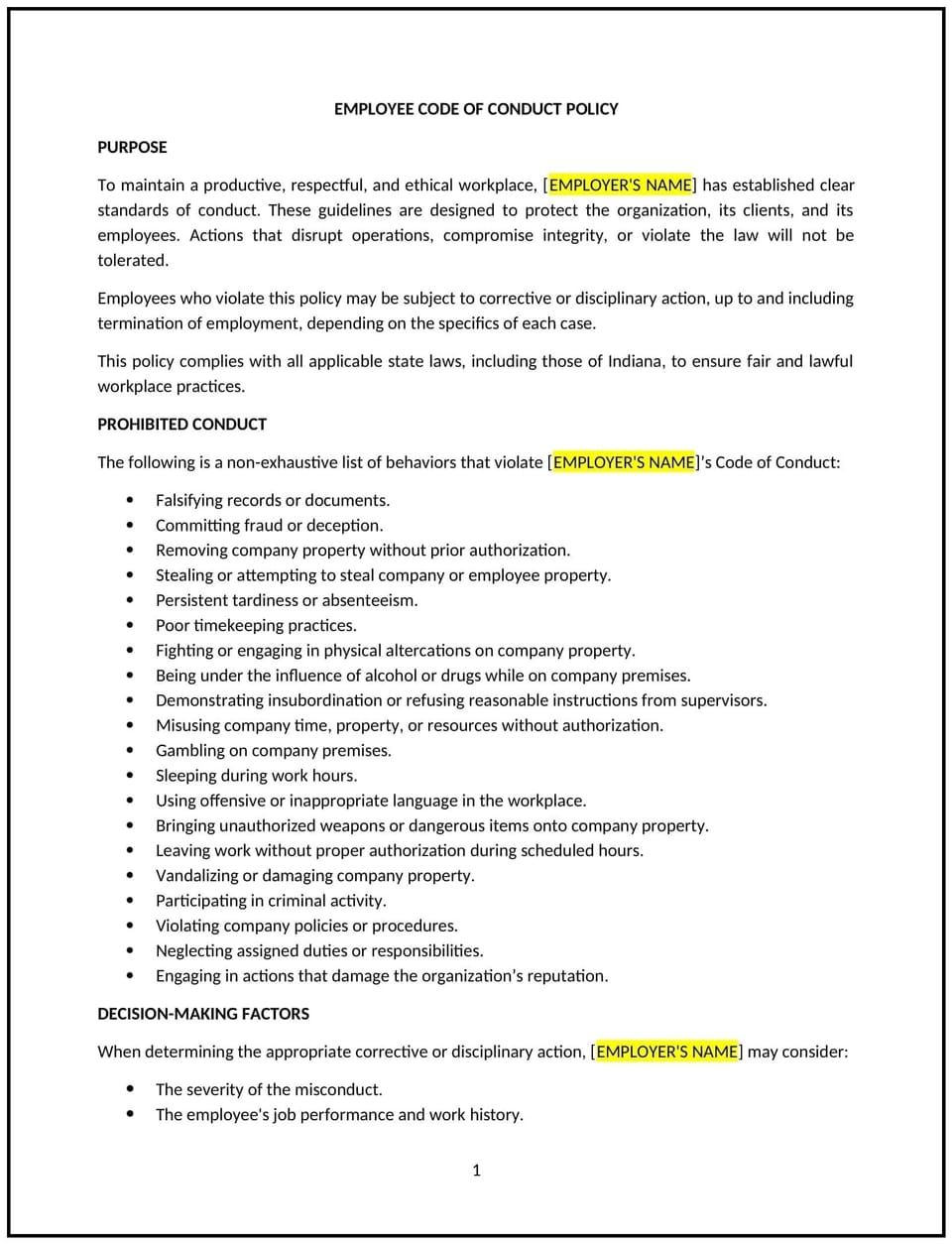Standards of conduct policy (Indiana): Free template

Standards of conduct policy (Indiana): Free template
This standards of conduct policy helps Indiana businesses outline expectations for professional behavior, ethics, and workplace conduct. It provides clear guidelines for employees on acceptable practices, interactions, and responsibilities while promoting a respectful and productive work environment. By defining these standards, businesses can address potential issues effectively and maintain workplace harmony.
By implementing this policy, Indiana businesses can foster a culture of accountability, professionalism, and mutual respect.
How to use this standards of conduct policy (Indiana)
- Define expected behavior: Clearly outline the behaviors expected from employees, such as professionalism, punctuality, and adherence to company policies. Include examples to provide clarity.
- Address prohibited conduct: Specify unacceptable behaviors, such as harassment, discrimination, theft, or other actions that could harm the workplace environment.
- Establish reporting procedures: Provide a clear process for reporting violations of the policy, including how employees can confidentially report concerns to management or HR.
- Set disciplinary guidelines: Outline the steps the business will take in response to policy violations, such as verbal warnings, written notices, or termination.
- Highlight responsibilities: Clarify employee responsibilities for understanding and adhering to the policy, including cooperating with investigations and maintaining professionalism.
- Include management expectations: Detail how managers should model appropriate behavior, address conduct issues, and enforce the policy consistently.
- Provide training resources: Offer training to employees and managers to help them understand the policy and their roles in fostering a positive workplace.
- Review and update regularly: Periodically review the policy to address changes in workplace needs or legal requirements in Indiana.
Benefits of using this standards of conduct policy (Indiana)
Implementing this policy provides several key benefits for Indiana businesses:
- Promotes professionalism: Encourages employees to act respectfully and responsibly in all workplace interactions.
- Reduces workplace conflicts: Sets clear expectations, minimizing misunderstandings and disputes.
- Protects business reputation: Helps maintain a positive image by ensuring employees represent the company appropriately.
- Enhances accountability: Provides a structured approach for addressing and resolving conduct-related issues.
- Supports legal compliance: Aligns with Indiana laws and regulations while promoting ethical behavior.
- Fosters inclusivity: Creates a work environment where all employees feel respected and valued.
Tips for using this standards of conduct policy (Indiana)
- Communicate the policy clearly: Distribute the policy to all employees during onboarding and include it in the employee handbook.
- Provide ongoing training: Offer regular training sessions to reinforce the policy and address any questions or concerns.
- Encourage open dialogue: Foster a workplace culture where employees feel comfortable discussing concerns or seeking clarification about the policy.
- Document incidents: Maintain thorough records of any reported violations, investigations, and outcomes to ensure consistent enforcement.
- Lead by example: Ensure managers model the expected standards of conduct to reinforce the importance of the policy.
- Regularly review the policy: Update the policy as needed to reflect changes in workplace practices or legal requirements in Indiana.
Q: What should businesses include in their standards of conduct policy?
A: A comprehensive policy should include guidelines on professionalism, prohibited behaviors, reporting procedures, disciplinary measures, and employee responsibilities.
Q: How can businesses address violations of the policy?
A: Businesses should follow a structured disciplinary process, starting with verbal or written warnings and escalating to termination if necessary. Consistency in enforcement is key.
Q: Are businesses required to provide training on the policy?
A: While not legally required, providing training helps ensure employees understand the policy and their responsibilities, reducing the risk of violations.
Q: How can businesses handle complaints about workplace conduct?
A: Businesses should investigate complaints promptly, maintain confidentiality, and take appropriate action based on the findings. Clear reporting procedures are essential.
Q: How often should the policy be reviewed?
A: The policy should be reviewed annually or whenever there are changes in workplace practices or applicable Indiana laws.
Q: Can businesses apply different standards for management and employees?
A: While expectations may vary based on roles, all employees, including management, should be held to the same core standards of professionalism and ethics.
Q: What documentation should businesses maintain for policy violations?
A: Businesses should document all incidents, including the nature of the violation, investigation steps, outcomes, and any disciplinary actions taken.
Q: How can businesses promote adherence to the policy?
A: Consistent enforcement, management role modeling, and regular training help reinforce the importance of the policy and promote adherence.
This article contains general legal information and does not contain legal advice. Cobrief is not a law firm or a substitute for an attorney or law firm. The law is complex and changes often. For legal advice, please ask a lawyer.


